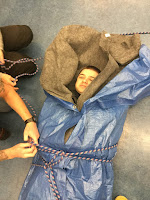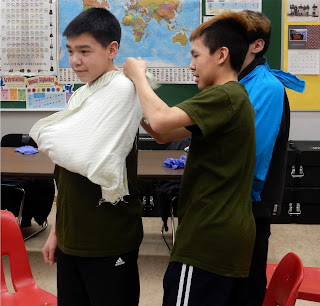Professional Improvement (PI) Week ran from February
13 to 17. Students across Nunavut got a
week off school. The teachers used the
time to acquire new skills and knowledge that would benefit their teaching
practice. This can be done by taking
online courses, participating in workshops, being tutored, or reading
professional materials. You’re allowed
to complete your PI outside of the community & territory where you teach;
you just have to fill out the necessary paperwork and build a strong case as to
why you should be allowed to travel to another community and/or outside the
territory.
This
was my second year as Inuujaq School’s PI Coordinator. Most of the staff was staying in town for the
week. Only a few would be travelling to
other communities. Starting as far back
as November 2016, I worked with the staff in getting their applications completed
and submitted on time. We were excited
that our individual PI amounts were increased.
Each Nunavut teacher receives a PI allotment of money they’re allowed to
spend. The amounts vary depending on the
location of the communities. The PI
Handbook explains in detail what teachers can & cannot purchase. Substantiation reports & receipts need to
be submitted after the conclusion of PI Week.
Any extra money that isn’t spent needs to be returned to the PI
Fund.
I
spent the first day completing an online course and doing professional reading. The online course was WHMIS – Workplace Hazardous Materials Information System.
The system is used for: cautionary labelling of WHMIS controlled
products, creating & maintaining material safety data sheets, and worker
education. All Government of Nunavut
employees are required to be WHMIS trained.
The online course was straight forward and can be completed in a day. I was glad I passed the final exam. For professional reading, I read a book about
helping students who struggle to learn.
(Learning is more than just regurgitating information).
I
spent the rest of the week getting recertified in First Aid & Level C CPR,
and learning Wilderness First Aid. JF,
the high school math/science teacher, organized the two workshops with Boreal First Aid. The company is based in Iqaluit,
Nunavut, & St. John’s, Newfoundland, and offers first aid and outdoor
education courses. JF negotiated
reasonable prices with Boreal and got enough people to sign up for the two
courses. A portion of our PI money would
go to paying for the instructor’s expenses & fees. Our instructor was René Ritter and he flew up
from Iqaluit, bringing with him several large boxes of gear. The workshops took place in JF’s classroom.
Tuesday
& Wednesday were for Standard First Aid & Level C CPR. Boreal is a Canadian Red Cross Training
Partner, so we all knew that René was well-trained, certified, and
experienced. What was even more
interesting was that he brought makeup, props, and fake blood for the simulated
scenarios. He explained that the best
way to prepare and react is to add realism to the scenarios. However, René did agree that some things may
become too much for some, like the sight of blood, so we all agreed on a safe
word that anyone can say when something becomes too much.
 |
| Ryan, media teacher, being fitted with a neck brace. |
Over
the course of two days we covered many topics, such as: CPR, abdominal thrusts,
how to operate an AED, cleaning & dressing wounds, making splints, the
recovery position, improvised stretchers, and how to be a leader. We practiced CPR and how to use an AED on dolls. For everything else, we practiced on each
other.
The
scenarios took place outside and focused on emergency situations that would happen
in the community. For example, adverse
effects of not taking prescribed medication(s), slipping & falling on hard
surface causing a broken bone, and working on a skidoo and inhaling noxious
fumes. René did contact the local RCMP
about the outdoor scenarios because there was a possibility that someone
walking by might misinterpret the scenario as a real life emergency. The teachers all got a chance to be a leader,
follower, and actor.
 |
| Grade 3 teacher, Sarah A, shows her left arm in a sling. |
A
debriefing was held after every scenario and everyone got a chance to talk
about what they learned and what they could have done differently. The scenarios showed us that the biggest
challenges are: being a confident leader, keeping everyone busy, and following
the proper procedures. We also found out
that some of us are really good actors.
A
final written exam was held on Tuesday. Unfortunately,
the exams were only in English & French.
Inuktitut versions are still being worked on. We would get the final results, and, if we
passed, our certificates in the mail.
 |
| Rene shows everyone how to to a patient's head steady. |
The
Wilderness First Aid class had fewer participants. We breezed through the first few chapters because
it’s a review of Standard First Aid. The
later chapters go into more detail on how to treat wounds, head & spin
injuries, bone & joint injuries, poisons, environmental emergencies, extended
care, and evacuation. The scenarios we
practiced indoors & outdoors dealt with situations that can arise when out
on the land and you’re far from Arctic Bay.
René also taught us how to treat someone involved in a vehicle accident
and how to carefully remove helmets.
 |
| I'm all wrapped up! |
There
are two moments that stand out for me.
The first one was when I volunteered to be a patient suffering from
hypothermia. René laid out several
blankets and instructed me to lie down.
Then he and the other teachers proceeded to wrap me up in the blankets
and tie them all together with rope so that I would “stay warm”. Judging from the photograph JF took, I was
wrapped like a burrito, or a bouquet of flowers, or a newborn baby. If they had left me there on the classroom
floor, I would have most likely fallen asleep.
The
second moment was when René asked me to be a patient in one of the wilderness scenarios. I played an atv enthusiast who overturned his
vehicle but was wearing a helmet. I just
had to keep my eyes closed and breathe slowly.
The teachers did a good job treating me until “help arrived”. I “regained consciousness” when René blew a whistle. Apparently, my acting skills were quite good
because some people who walked by thought I was really injured.
The wilderness
scenarios used a lot more makeup and fake blood. I was glad that no one fainted or had a
serious freak out. We became more
confident and comfortable in handling emergency situations. We all felt better prepared for the next time
we would go out on the land. The final
written exam was held Friday afternoon.
Once again, they were only available in English & French. I hope the Canadian Red Cross are looking
into translating their course materials in Inuktitut and Inuinnaqtun.
We
all thanked René for coming to Arctic Bay.
 |
| Cadets practice making slings. |
Just
before René flew down to Iqaluit, he taught first aid to several second year
cadets. The three-hour crash-course
lesson took place in my classroom on Friday evening. The cadets practiced CPR on dolls, how to
properly administer abdominal thrusts, wrapped bandages, and made slings.
 |
| Cadets practice making slings. |
The
teaching staff took the time to celebrate the birthday of a co-worker on
Wednesday. John, the Grade 8 teacher,
was turning 19 . . . according to the birthday cake JF made for him. When the candles were lit, everyone sang
Happy Birthday. John cut the cake into
equal pieces and everyone enjoyed a slice.
I
went to the Co-op store on the last day of PI Week and purchased snacks for the
teaching staff. I also brought two large
blocks of mild Gouda cheese and a tray of smoked Norwegian salmon from
home. JF brought home-made bagels and we
made smoked salmon sandwiches with them.
Everything was laid out in the staff room just in time for the last
afternoon break. The staff thanked me
for the snacks and said the food was very tasty. Judging from the conversations in the staff
room, everyone had a successful PI Week.
We would all spend the next several weeks completing our activity &
substantiation reports.

No comments:
Post a Comment